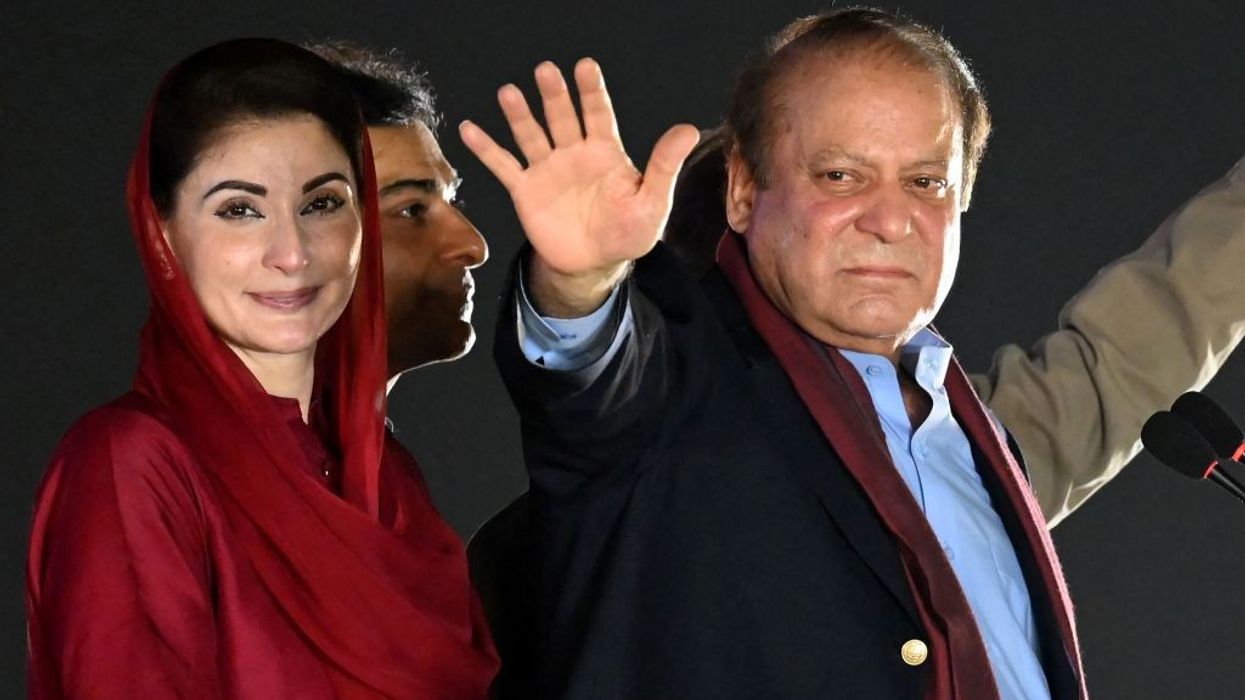THREE-TIME Pakistan prime minister Nawaz Sharif ended four years of self-imposed exile on Saturday (21), launching his political comeback at a rally attended by thousands of rapturous supporters ahead of elections due next year.
Fireworks marked his arrival at the event in a park in his power base of Lahore, where the streets have been shrouded in green and yellow party banners.
Pakistan is facing overlapping security, economic and political crises ahead of polls pushed back to January 2024, with Sharif's major opponent, the fiercely popular Imran Khan, languishing in jail.
"I am meeting you after a long time, but my love for you remains intact. You have never betrayed me and I have never betrayed you," he told the crowds, wearing his signature red scarf.
His speech focussed on the need to tame runaway inflation and for national unity - in an apparent swipe at Khan, whose campaign for re-election has targeted military generals as well as the judiciary.
"There is no room for mistakes," he said. "We need to start a new journey."
Sharif - who founded the Pakistan Muslim League-Nawaz (PML-N) party - was serving a prison sentence for graft when he left the country in 2018 seeking medical care in Britain, subsequently ignoring multiple court orders to return.
Analysts say he has likely brokered a deal with the powerful military establishment, and last week a court granted him protective bail, temporarily removing the threat of arrest.
The "Lion of Punjab" touched down briefly in Islamabad, where he signed court papers, before flying on to Lahore and taking a helicopter to the Greater Iqbal Park, where he addressed supporters.
More than 7,000 police were enlisted to control crowds, according to a senior officer on site.
"I'm here to welcome my leader. The inflation is very high and poor people are desperate," said 18-year-old Razi Ullah. "God has given him a chance to come back and turn things around. He's done it before."
Sharif's return has been touted for months by his party, which hopes his political clout and "man of the soil" swagger will revive its flagging popularity.
Return of the kingpin
Sharif has been prime minister three times but has never completed a full term.
His political fortunes rise and fall on his relationship with Pakistan's military establishment – the country's true kingmakers who have ruled directly for more than half of its history and continue to enjoy immense power.
His last term ended when he was ousted in 2017 and given a lifetime disqualification from politics after being convicted of corruption in a case he says was politically motivated.
Khan then stormed to power backed by young voters - and, analysts say, the military.
Months later, Sharif got permission to seek medical care in Britain. He is widely believed to have continued pulling the strings of his party from a luxury property in London.
His fortunes changed when Khan had a spectacular falling out with the top brass. The former cricketing superstar was later jailed over several cases he said are designed to keep him from contesting elections.
Nawaz Sharif's younger brother Shehbaz, who enjoys a closer relationship with the military than Nawaz, came to power in a coalition that ousted Khan.
Shehbaz's government oversaw a change to the law limiting the disqualification of lawmakers from contesting elections to five years - paving the way for his return.
Legal hurdles blocking Sharif from power are likely being removed as part of a backroom deal between his party and the army, said analyst Zahid Hussain.
"There was some sort of arrangement with the military establishment; without that, he wouldn't have decided to come back," he said.
However, his brother's short reign in power coincided with a stint of runaway inflation and a currency reserve crisis that brought the nation to the brink of default - denting the party's credibility.
"Sharif's key challenge is first to establish himself and his party as viable options to replace Imran Khan, who is already popular, and secondly to turn around the economy," said political analyst Ayesha Siddiqa.
(AFP)
Nawaz Sharif arrives home in political comeback bid
I am meeting you after a long time, but my love for you remains intact: former prime minister tells supporters in Lahore
















 John Dramani Mahama welcomes Modi on his arrival in Accra last Wednesday (2)
John Dramani Mahama welcomes Modi on his arrival in Accra last Wednesday (2) South Africa’s president Cyril Ramaphosa, Brazil’s president Luiz Inacio Lula da Silva, Modi and China’s premier Li Qiang at the Brics summit last Sunday (6)
South Africa’s president Cyril Ramaphosa, Brazil’s president Luiz Inacio Lula da Silva, Modi and China’s premier Li Qiang at the Brics summit last Sunday (6)

